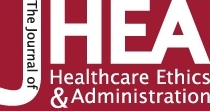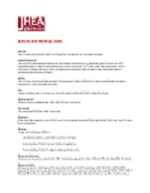Author Guidelines
Electronic publication & Open Acces
Electronic publication of original high-quality articles on the internet has already become an increasingly powerful way to disseminate knowledge and research results among scholars, scientists, and administrators. The quality e-journal articles, particularly with open access, have apparent advantages such as broader distribution and the speed of publication, compared to their counterpart, print journal articles.
All of the articles of the Journal of Healthcare Ethics & and Administration will be published online and immediately available to everyone, for free of charge. After your manuscript is accepted the corresponding author will be invited to complete 1) an online copyright license to publish and to accept 2) the mandatory agreement that the article can be distributed only through download on the JHEA webpage. And all submissions from our authors are accepted with the understanding that it is to be published exclusively in the JHEA, unless other arrangements are made in advance.
The Journal's Scope
The Editorial Board of the JHEA encourages the submission of commentaries, original research, review articles as well as case studies and book reviews. Of special interest are articles with a broad focus on theoretical, clinical, and practical ethical issues related to medical ethics and healthcare administration. Some of the topics we took a keen interest in include normative criteria of practical decision-makings, issues of social justice, ethical and legal implications of new clinical research results, moral issues in emerging medical technologies, physician-patient relations, ethical issues of healthcare management, etc.
General Information
Autorship
The authorship of the paper should be confined to those who have made a significant contribution to the design and execution of the work.
Please keep in mind, if you are a professor advising on a student paper in a teacher-student relationship, the JHEA does not consider you as the author of the paper. The professor should be acknowledged, but should not receive authorship credit.
Authors transfer their copyright to the JHEA but do not lose the right to reprint their articles from the JHEA website. If a manuscript is not accepted, or is withdrawn before publication, the transfer of copyright is null and void.
Conflicts of Interest
The JHEA expects that reviewers will abide by high ethical standards with respect to publication process. All people involved in publication process, including the editorial team, advisory board members, authors, and reviewers should not have a conflict of interest. The reviewers who have a conflict of interest, particularly financial, are asked to notify the Journal Editor. Authors must inform the Editor in writing of any financial arrangements, organizational affiliations, or other relationships that might constitute a conflict of interest regarding the subject matter of the manuscript. All published articles and letters include a description of any financial support and any other conflict of interest that readers should know about.
Review Process
All manuscripts submitted to the JHEA are submitted to blind peer-review. And there exist two steps of review process. The first step is screening before submission review which can be called “screening review” and the other is “submission review.” In the first review process, the editorial staff (Editor and Associate Editors) decides if the article submitted anonymously should be rejected without further review. Some of the reasons for rejection in the screening review include the followings: the quality of manuscripts does not merit further attention, the scope of manuscripts does not fit the portfolio of the journal, there exists redundancy with recent materials already published, there are found multiple submissions of the same material to other journals, plagiarism is suspected. And the manuscript which has passed the screening review goes to submission review.
Permission to Reprint
Authors who include illustrations or tables taken from other publications in their manuscript must obtain written permission to reproduce this information from the original publisher of the source material.
Human and Animal Research
When reporting experiments on human subjects, authors should indicate whether the procedures followed were in accordance with the ethical standards of the responsible committee on human experimentation. All research manuscripts where human subjects were used must have the relevant Institutional Review Board (IRB) approval letter included with the submission. When researches report experiments on animal subjects, authors must indicate whether the institutional and national guide for the care and use of laboratory animals was followed.
Commentaries and Editorials
Commentaries and Editorials focus on general topics on healthcare ethics and administration. Commentary and editorials are at the invitation of the Editor only. The authors who would like to get invited to submit commentaries can email to the Editor at any time.
Book Reviews
If you are a publisher and wish to submit books for book review, please send them to the Managing Editor at the address below. If you are a reviewer, please include full publishing details including ISBNs.
Dr. Peter Clark
Managing Director of the JHEA
pclark@sju.edu
The Institute of Clinical Bioethics
Saint Joseph’s University
5600 City Ave
Philadelphia, PA 19131
The JHEA invites readers to review current books, monographs, or audiovisual materials of interest to theoretical, practical, and clinical ethical issues and problems related to healthcare and administration. The review should include the reviewed material’s title, author, publisher, city and state, year of publication, and number of pages. The review should not exceed 3 single-spaced pages.

